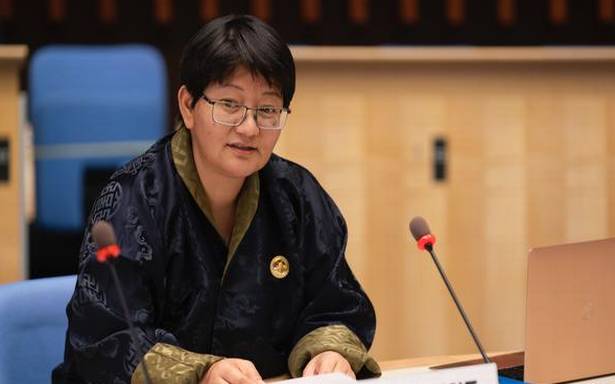Officials in New Delhi indicate only a political intervention would allow vaccines to be exported now
With no vaccines in sight, and just days to go to for Bhutan’s own deadline for giving its eligible population of half a million people their second dose of Covid vaccines, India’s smallest neighbour is searching for any alternative that could help, its Health Minister said.
A spurt in the number of “Delta variant” cases coming in from Bhutan’s southern border with India, is adding to the worries that its healthcare system could “collapse” in the event of the pandemic spreading.
Officials in New Delhi said no decision had been taken on when to provide Bhutan the promised second doses of Covishield, indicating that only a political decision to deliver them could change that, as Bhutan needs, in the next two weeks. However sources said India was actively involved in helping Bhutan facilitate the vaccines from "elsewhere".
“We are praying that countries will come forward to help Bhutan out, understanding the risks that we have as a small nation, understanding the health system that we have as a small nation,” Health Minister Lyonpo Dechen Wangmo told The Hindu in an exclusive interview, speaking from Thimphu, where she has just completed her 21-day quarantine after returning from the Global Health Assembly in Geneva.
“Above all, it is also a very good opportunity to generate some very good scientific data as well,” Ms. Wangmo added, explaining that Bhutan’s government is “optimistic” about procuring the vaccines and is open to all options including “mixing and matching” or heterologous inoculation, using a different second vaccine, and has reached out to at least 16 countries other than India in the last few weeks.
The Modi government had sent 5,50,000 Covishield doses as part of its “Vaccine Maitri” programme to Bhutan by March 21. With the first tranche delivered and the second dose promised within “eight to twelve weeks”, the Bhutanese government set about vaccinating nearly 93% of its adult population between March 27 and April 6.
The “Vaccine Maitri” programme was however, suspended in the wake of the deadly second Covid wave that hit India shortly after.
In April, after cases in India began to rise, New Delhi reportedly informed Bhutan there would be a delay, but Bhutan still hoped that the doses would be delivered by the end of June, when 14 weeks would have elapsed.
Ms. Wangmo said that after consulting a few international experts the government has now decided to extend the gap to 16 weeks, but needs the second doses delivered by mid-July at the very latest for the vaccines to be efficacious.
While the global COVAX alliance has promised to send 20% of Bhutan’s requirement of AstraZeneca vaccines, these might only be delivered by August, and the U.S.’s announcement on June 21 that it would distribute 16 million U.S.-made (Pfizer, Moderna and Johnson & Johnson) vaccines in Asian countries including Bhutan has not clarified when these may arrive.
India hit record highs in vaccine production and distribution last week, but the government has “no plans currently” to restart its Vaccine Maitri initiative for Bhutan, three senior officials aware of the vaccine export negotiations told The Hindu.
“India is going through a difficult time right now. So, it is morally not right to put such pressure,” Ms. Wangmo said, when asked if Bhutan had made any fresh appeals for help from New Delhi.
“If India was comfortable, I know India would come forward to help us, based on the long diplomatic relations that we have with India, and more importantly the friendship that we have with India. I think there would not be an ounce of hesitation,” she added.
Meanwhile, Ms. Wangmo said the number of COVID-19 cases from towns bordering India has been rising, with Bhutan registering more than 2,000 cases but only one death so far. In an effort to step up “non-pharmaceutical” solutions, even Bhutan’s King Jigme Khesar Namgyel Wangchuck has been travelling by road and foot to remote villages around the country to reinforce the use of masks and sanitizing hands.
“I think the global community must understand that Bhutan does not have a mature health system, like many of the countries in the region do, and for example, we have only one ICU doctor. So if our health systems were to get overwhelmed, it would basically collapse our system,” Ms. Wangmo explained.
Source: Read Full Article

